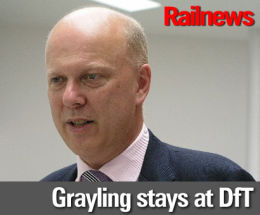Posted 18th January 2018 | 4 Comments
New Transport ministers facing ‘key challenges’

THE Department for Transport ministerial team consists of mostly new faces after the New Year cabinet reshuffle, although rumours that transport secretary Chris Grayling was set to be moved by Theresa May turned out to be unfounded.
The new team will face a number of challenges, according to the Railway Industry Association.
Chief executive Darren Caplan said: “I would like to welcome Jo Johnson MP, the new rail minister, and Nusrat Ghani MP, the new Minister for HS2, on behalf of the Railway Industry Association and its members. This is an exciting time for both to be coming in to rail, with a record of rising passenger numbers and freight in the sector, a strong safety record amongst the highest in Europe, and with rail companies working hard to support economic growth across the UK and export world-class products and services overseas.
“From our perspective, the key challenges now facing the new Ministerial team are ensuring greater consistency in rail funding to avoid boom and bust in network investment, continuing support for major infrastructure projects such as Crossrail, HS2, Northern Powerhouse Rail, Crossrail 2 and East-West Rail, addressing the challenges and opportunities of Brexit, and helping rail secure a sector deal as part of the Government’s Industrial Strategy.
“I would also like to warmly thank former rail minister Paul Maynard for his invaluable work with our sector. He has been a great champion of the rail supply sector, backing its growth both in the UK and on trade missions overseas to support our sector’s exports drive. We will miss his commitment, enthusiasm, and personable character!. And we wish him the best of luck in his new role as a Government Whip.”
Reader Comments:
Views expressed in submitted comments are that of the author, and not necessarily shared by Railnews.

david c smith, Bletchley
As far as HS2 is concerned, it does seem Birmingham and Manchester are too close to the capital for the Very High Speeds to acheive very much. It would have been a good deal cheaper to make Northeast England / Edinburgh / Clydeside the main "targets", via an East Coast alignment ; this would open up new day - return opportunities, with a consequent "sea - change" in extra benefit.
As for bimode, the future for non - electrified sections must lie with the rapidly developing battery and fuel cell technologies. Existing diesel engines could perhaps gain environmetally from being converted to run off LNG ( liqueified natural gas ) ?
phil, SHOREHAM-BY-SEA
Frightening lack of understanding (or maybe just lies) from Chris Grayling
A bi-mode train dragging along a heavy diesel engine while travelling along electrified lines for part of the journey could never be as fast, quiet, efficient or as ecological as an electric train.
Bi-mode is not a long-term replacement for electrification although it will have some limited benefits in the short-term. We need to be planning on gradually phasing out ALL diesel engines on rail, as we are on the roads.
Chris Jones-Bridger, Buckley
As ever the transport department is a revolving door for ministers. Given the time required to master a new brief is it any wonder that consistency of policy is lacking & decisions on key investment are forever delayed?
Stephen Plowden, London
The fact that they Railway Industry Association supports HS2 proves that it is simply an unscrupulous producer pressure group , putting the interests of its members above the public interest. All the desirable objectives of HS2 can be achieved by cheaper and less damaging means. HS2 will do lasting damage to some of Britain's most precious countryside and in London. It is only by ignoring this that HS2 can be shown to have a positive benefit cost ratio and only then when it is compared with a do minimum alternative rather than with the plans that, had the rules of project formulation been followed, they should have been compared with. It should have been compared with. There are numerous mistakes or unwarranted assumptions in the calculations. Nor do they take any account of Michael Byng's calculations, which suggest that the cost will be almost twice the official estimates. All this at a time when other public services are crying out for cash.